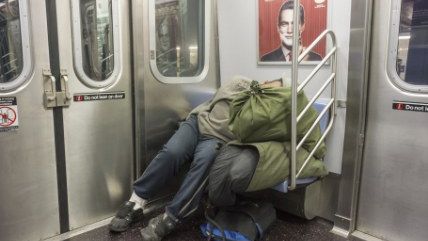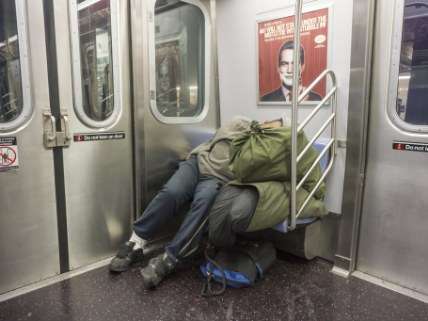Homeless Survival and Property Rights Collide in Court Ruling
Let's not ignore the ordinances and harassment of the poor that led to this.


Should basic survival be permitted to trump property rights? And what are the implications for saying "yes"? We may find out in Massachusetts. The state's Supreme Judicial Court has ruled that a homeless man can fight criminal trespassing charges by claiming it's the only way for him to protect himself from the cold.
Note that this doesn't necessarily mean the gentleman would be allowed to just barge in anywhere because of the chill or even that a jury or judge will buy the argument. The issue was that a judge denied the ability for the homeless man to use "necessity" as a defense to a jury. The Associated Press explains:
In a unanimous, 7-0 ruling, the court threw out six 2014 trespassing convictions. The court said the necessity defense allows a jury to weigh the plight of a homeless person against any harm caused by a trespass before determining criminal responsibility.
"Our law does not permit punishment of the homeless simply for being homeless," Justice Geraldine Hines wrote for the court.
The court noted that its ruling was not an open invitation for homeless people to trespass.
"Allowing a defendant to defend his trespassing charges by claiming necessity will not, of course, condone all illegal trespass by homeless persons," Hines wrote.
The owners of the properties had gotten orders to stop the guy from trespassing, so there's a definite conflict here between the right of the homeless man to find refuge from extreme weather and the rights of the property owners to control who is and is not permitted in their spaces.
But we needn't have to accept that this conflict is a natural consequence of having homeless among us. Let us not forget the many, many ways that municipalities make it hard for the poorest among us to solve their own problems. Let's drive across country to Los Angeles, where homeless folks are probably not likely to have to suffer much from cold weather. But they have to deal with municipal regulations designed to keep them from a sleep solution that doesn't violate anybody else's property rights at all. Los Angeles wants to adopt a new ban on homeless people sleeping in their own vehicles in many public spaces.
Los Angeles actually already had a ban on sleeping in one's vehicles (as do many California cities) but it was struck down in 2014. Judges ruled that the wording of the law was so unclear that it was being used by police to threaten people based on having food and personal property in their vehicles and even for sleeping in their cars on private property.
Los Angeles didn't fight the decision and said they would craft a new, clearer ordinance. And now it's back for consideration. From the Los Angeles Times:
At the city's homelessness and poverty committee Wednesday, Councilman Mike Bonin proposed barring homeless people from "lodging" in vehicles parked by homes and schools, while allowing them to sleep in their cars and campers from 9 p.m. to 6 a.m. in commercial areas and in designated city, nonprofit agency and church lots.
Bonin said his proposal could forestall a more sweeping ban and avoid repeating what he called "absurd and pathetic" scenarios of the past, when police would ask people to get out of their cars to sleep on the sidewalks.
Homeless advocates said they doubt the city will come up with enough designated spaces to serve the city's homeless (the number of cars and RVs that are being used for living space in Los Angeles is estimated at around 4,600). And given that violating the law is a misdemeanor violation, they fear it will be used by police to harass the poor (and take and destroy their property). Furthermore, Los Angeles makes it hard for homeless or extremely poor people to work their way out of their situation by keeping them from being street vendors. Oh, and don't forget that incoming $15 minimum wage that will make it even harder for them to get jobs! Even giving them tiny houses to live in is not considered an acceptable solution.
Of course, property owners themselves contribute to this situation by encouraging cities to implement these ordinances because they don't like the visual blight and the annoyances that come from the homeless. But the confluence of all these policies coming together this way simply makes homelessness even more miserable and difficult than it already is.


Show Comments (198)